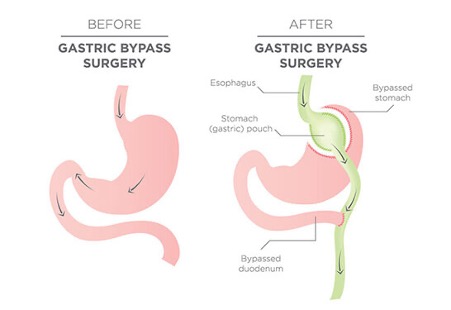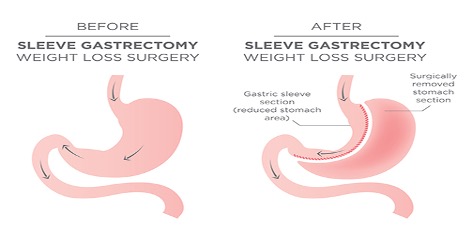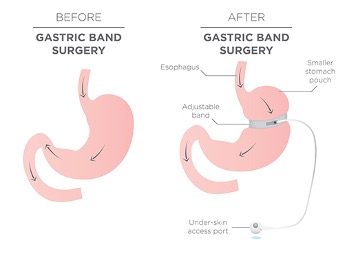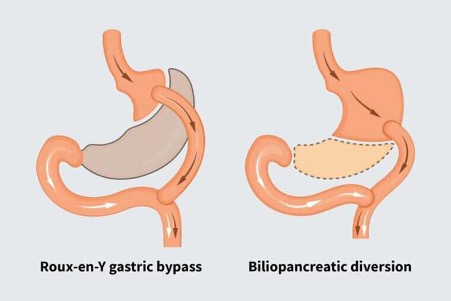- Bariatric/ Metabolic surgery
Bariatric Surgery in Vijayawada
MIG Hospital is the best Hospital for Bariatric Surgery in Vijayawada. Looking for the Bariatric or Metabolic surgery? Then consult Dr. Sure Pavan Kumar one of the Top 10 Bariatric Surgeon Doctors in Vijayawada.
Metabolic Surgery in Vijayawada is provided by Dr. Sure Pavan Kumar one of the Best Gastroenterologists. It is a surgical procedure that helps to lose weight by reducing the size of the stomach. Get the best Bariatric Surgery treatment at MIG Hospital in the best price.
Obesity is a chronic and progressive disease that can affect multiple organs in the body. People with clinically severe obesity are at great medical risk of disability or premature death. High blood pressure caused by clinically severe obesity can contribute to heart attacks, congestive heart failure and stroke. Health concerns such as diabetes, sleep apnea, asthma, low back pain, arthritis, urinary stress incontinence and severe acid reflux (GERD) are also a result of increased weight. Weight loss can help these patients by reducing or completely removing these problems.
Bariatric/Weight Loss Surgery Hospital in Vijayawada
However, as is true for other treatments for obesity, successful results depend significantly on knowledge, personal motivation and behaviour. Metabolic Surgery in Vijayawada is a surgical procedures are also strikingly progressing in other metabolic dysfunctions such as hypertension and hyperlipidaemia in patients without or with obesity. MIG Hospital at Vijayawada provides you with the best Bariatric/Weight Loss Surgery in Vijayawada.
What is weight loss or Metabolic Surgery?
Weight loss surgery, sometimes called “bariatric surgery,” is surgery to help you lose weight. It works by making you take in fewer calories and nutrients. MIG Hospital have one of the Top 10 Bariatric Surgeon Doctors in Vijayawada
Who can have weight loss surgery?
Doctors use a measure called “body mass index,” or BMI, to decide who can have weight loss surgery. Your BMI will tell you whether your weight is normal for your height
Weight loss surgery is appropriate only if you have not been able to lose weight through other means and if you:
⦁ Have a BMI above 40 and have not responded to diet, exercise, or weight loss medicines; or
⦁ Have a BMI above 35 and also have a medical problem related to obesity, such as diabetes, heart disease, or high blood pressure; or
⦁ Have a BMI above 30, but only if you have certain medical conditions
⦁ Diabetes (type II)
⦁ High blood pressure
⦁ Sleep apnea
⦁ Gastroesophageal reflux
⦁ High cholesterol / triglycerides
⦁ Depression because of obesity
⦁ Degenerative arthritis
Before deciding whether or not you are a candidate for bariatric surgery, your doctor will conduct a comprehensive medical evaluation that may include blood tests, EKG, chest x-ray, pulmonary function test, upper gastrointestinal x-ray, gallbladder ultrasound and/or a psychiatric evaluation
Health benefits of Bariatric Surgery treatment
What to expect
The health benefits of losing weight are countless. Most patients will lose between 50-70% of their excess weight. The exact amount of weight that is lost will depend on compliance with dietary and exercise guidelines after surgery and follow-up in the program. The time over which the weight loss occurs depends on the procedure that is chosen. The risks of many of the serious diseases associated with obesity decline dramatically as weight loss occurs and many conditions can be reversed. Many of the medications required for the diseases can be stopped or the dosages lowered.
⦁ Diabetes – More than 80% of Type II diabetics have complete resolution of their diabetes, and many others have greatly improved control. This usually occurs within a few weeks of surgery for gastric bypass patients, and slightly longer for Lap-Band patients. Patients are able to come off their medications including insulin injections and have normal blood glucose and Hemoglobin A1C levels.
⦁ Hypertension/High Blood Pressure – Over 70% of patients are able to come off all of their anti-hypertensive medications. Many other patients are able to significantly reduce the number or dosages of their medications.
⦁ High Cholesterol – Over 80-90% of patients will develop normal cholesterol levels within two to three months after gastric bypass, with significant improvement seen for Lap-Band patients as well.
⦁ Sleep Apnea Syndrome/Hypoventilation – The large majority of patients have improved breathing at night and overall decreased shortness of breath following weight loss. Sleep apnea is resolved in over 85% of patients. Patients feel refreshed and usually no longer require accessory breathing apparatus after weight loss.
⦁ Degenerative Joint Disease – Patients who have significant joint pain which limits their activities find after surgery they can now participate in many activities and social events, even sports. Lower back pain and disc disease is often relieved and overall improvement is usually seen with as little as 25-30 pounds of weight loss. If nerve injury or structural damage had already occurred, the complete relief of pain cannot be expected.
⦁ Acid Reflux – Bariatric surgery is an excellent method of treating acid reflux disease. Relief is usually noticed within a few days of the surgery.
⦁ Other conditions which have been shown to greatly improve after surgery include asthma, stress urinary incontinence, polycystic ovary syndrome and many others. Many of the conditions improve as quickly as a few months after surgery.
How does Bariatric surgery promote weight reduction ?
Bariatric surgery produces weight loss by restricting food intake and, in some cases, interfering with nutrition through malabsorption. Patients who undergo bariatric surgery must also commit to a lifetime of healthy eating and regular physical activity. These healthy habits help ensure that the weight loss from surgery is successfully maintained
Are there different types of weight loss surgery?
Each has its own benefits and risks. To select the option that is best for you, you and your physician will consider that operation’s benefits and risks along with many other factors, including BMI, eating behaviours, obesity-related health conditions, and previous operations.
There are many different types. The most common are
Gastric bypass
Gastric bypass is short for “Roux-en-Y gastric bypass,” and is sometimes called “RYGB.” For this surgery the doctor closes off part of the stomach, leaving only a small pouch for food. Then he or she connects the stomach pouch to the middle part of the small intestine. This allows food to “bypass” or reroute around a part of the stomach and small intestine.


Gastric sleeve
Gastric sleeve, also known as “sleeve gastrectomy,” is a surgery that turns the stomach into something that looks like a sleeve. In other words, the doctor removes a large portion of the stomach and leaves a narrow tube
Adjustible gastric band
It works primarily by decreasing food intake. Food intake is limited by placing a small band around the top of the stomach to produce a small pouch about the size of a thumb. The outlet size is controlled by a circular balloon inside the band that can be inflated or deflated with saline solution to meet the needs of the patient.


Biliopancreatic Diversion With a Duodenal Switch
BPD-DS, usually referred to as a “duodenal switch,” is a complex bariatric operation that principally includes 1) removing a large portion of the stomach to promote smaller meal sizes, 2) re-routing of food away from much of the small intestine to partially prevent absorption of food, and 3) re-routing of bile and other digestive juices which impair digestion.
This operation leaves a small portion of the duodenum available for food and the absorption of some vitamins and minerals. However, food that is eaten by the patient bypasses the majority of the duodenum. The distance between the stomach and colon is made much shorter after this operation, thus promoting malabsorption. BPD-DS produces significant weight loss. However, there is greater risk of long-term complications because of decreased absorption of food, vitamins, and minerals
How is the surgery done?
Almost all gastric bypass and gastric sleeve procedures are done as “laparoscopic” surgery. For laparoscopic surgery, the surgeon makes a small cut and inserts a narrow tool that has a tiny camera on the end into the belly. This tool is called a “laparoscope.” It allows the surgeon to see inside the belly without opening it up all the way. Then the surgeon can do the surgery using other tools that fit through small openings in the belly and that can be controlled from the outside.
How do the different procedures compare?
Each type of weight loss surgery is different, and each has different benefits and downsides.
⦁ Gastric bypass leads to the most weight loss and works the fastest, but it involves the most serious surgery with the highest risks. It can also cause problems in how your body absorbs nutrients. As a result it can lead to “nutritional deficiencies,” meaning that your body is missing important nutrients. This can sometimes make you sick. If you have gastric bypass, your doctor will monitor your nutrient levels afterward.
⦁ Sleeve gastrectomy is safer than gastric bypass because it does not involve rerouting or cutting and reattaching the intestines, and because it is less likely to cause problems with how your absorb nutrients. It might also be safer because it does not involve any plastic materials that stay in your body.
⦁ BPD-DS produces significant weight loss. However, there is greater risk of long-term complications because of decreased absorption of food, vitamins, and minerals
How do I know which surgery is best for me?
The decision about which type of surgery to have is important. Discuss your choices with your doctor.
If you have different options, ask the following questions:
⦁ About how much weight can I expect to lose with each option?
⦁ How long will it take me to lose the weight?
⦁ What are the risks of each option for someone like me?
⦁ What changes will I need to make to my diet and lifestyle with each option?
Whatever you decide, make sure your surgeon is very experienced with weight loss surgery. Also, check with the staff at your treatment center or make sure it is a certified “Center of Excellence.” Those centers have a team of nurses and doctors who specialize in taking care of patients like you. If you are at all unsure about your decision, you can ask for an opinion from another doctor. Most hospitals that have experience with weight loss surgery offer patient education sessions where you can learn more about weight loss surgery and the options you have.
What are the benefits of surgery?
In addition to helping you lose weight, surgery can help improve or even get rid of certain health problems, including:
⦁ Diabetes
⦁ High blood pressure
⦁ High cholesterol
⦁ Sleep apnea, a disorder that causes you to stop breathing for short amounts of time while you sleep
What are the risks of Bariatric and Metabolic Surgery?
The risks of surgery are different depending on:
⦁ What type of weight loss surgery you have
⦁ Whether your surgery is open or laparoscopic
⦁ Your age and overall health
⦁ How experienced your surgeon is
In general the risks could include:
⦁ Bleeding
⦁ Infection inside the belly or in the wounds from surgery
⦁ Leaks from the incisions on the stomach or intestine
⦁ A blockage or tear in the intestines
⦁ Problems with the heart or lungs, including blood clots
⦁ Gallstones
⦁ Nutritional problems
⦁ Severe diarrhea
⦁ The need for more surgery
As with any kind of surgery, it is possible for these procedures to lead to serious problems or even death. Death following weight loss surgery is very rare. But it’s still important to talk to your doctor about all the possible risks of each type of surgery.
Will I need to change the way I eat after surgery?
Yes.
Work with a nutritionist (a food expert) to learn how your diet should change.
You will need to eat healthy foods that “work with” your surgery. For example, you should choose foods high in protein and low in fat and calories. You should also avoid liquid foods that are high in calories, such as ice cream. If you eat the wrong things, you could hurt your chances of losing weight.
If you have weight loss surgery, you will need to avoid certain foods that could make you sick. Plus you will probably need to take special multivitamins with minerals. That’s because weight loss surgery, especially gastric bypass, can make it hard for your body to get all the nutrition it needs. You must keep taking the vitamins for the rest of your life. Your body will always need them to stay healthy.
Mini Gastric Bypass Surgery
Laparoscopic Mini Gastric Bypass which is also called as one anastomosis gastric bypass as well as omega loop gastric bypass or modified Billroth II procedure. In this the Gastric pouch is like a long sleeve which is anastomosed (joined) to the intestines, making a loop thereby finishing the procedure with only single anastomosis.
It has a theoretical advantage over RYGB in causing no intestinal obstruction in long term follow up. The results of excess weight loss and resolution of co morbidities is similar to that of RYGB. This procedure is primarily a malabsorptive procedure as compared to the classical RYGB.
Life after surgery
Recovery
The recovery time and process vary with every individual, depending on the surgical procedure and a variety of other factors. Generally speaking, by following an exercise regimen and dietary guidelines closely – and taking the prescribed medication – you’ll be back to normal activities before you know it.
Resuming a normal diet will take some time and patience, as you adjust to a new way of eating.
Support After Surgery
your treatment doesn’t end after the surgery is completed – far from it. We offer a comprehensive, fully integrated program of follow-up, including ongoing education (both in person and online), fitness, nutrition, support, and community activities – all designed to keep you on a long-term path to wellness.
Nutrition
In post-operative patients, we ask that patients take vitamins and supplements due to their rapid weight loss and dietary changes. We continue to monitor your nutrition over time with testing. When abnormalities arise, we can fix them quickly avoiding trouble and keeping you healthy.
Exercise
Exercise is important. We all know that. Most of patients are not in good condition because of their excess weight and lack of activity. It is our responsibility to help you become more capable and active. Stamina and flexibility are the main goals. Helping you return to independence in your life is an important target in our program. Maintaining that independence is really key. It’s not how much weight you lose that counts, it’s how much your life improves and how much you keep off that matters. Our specialists are here to help. It’s your life. It’s your choice.
